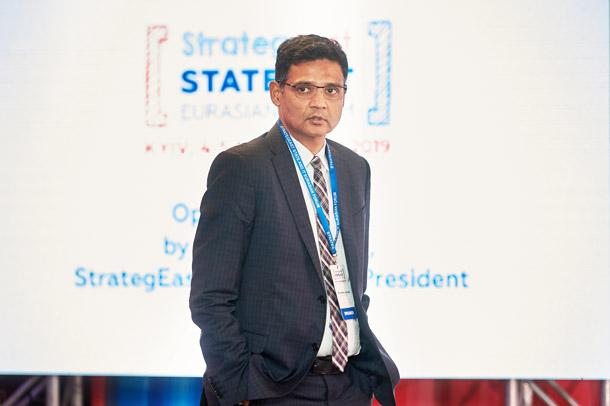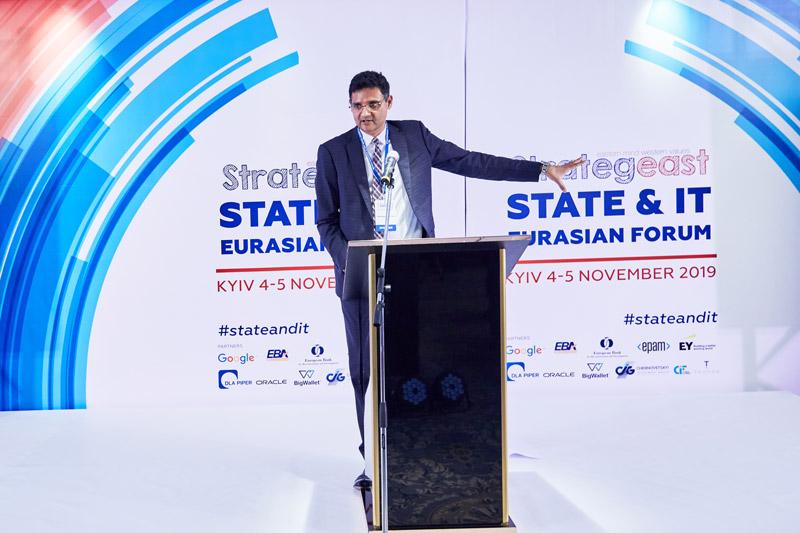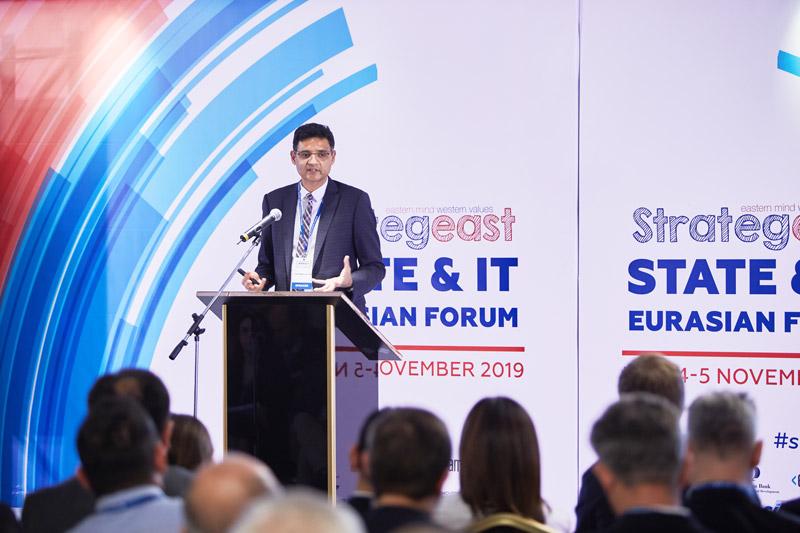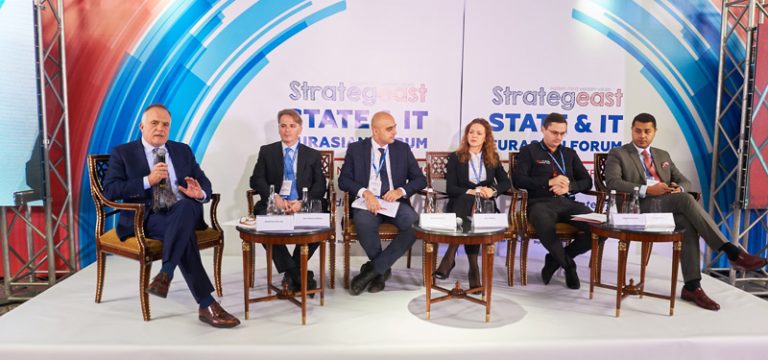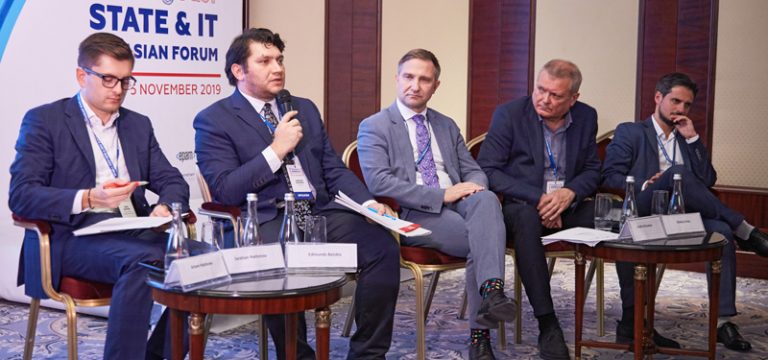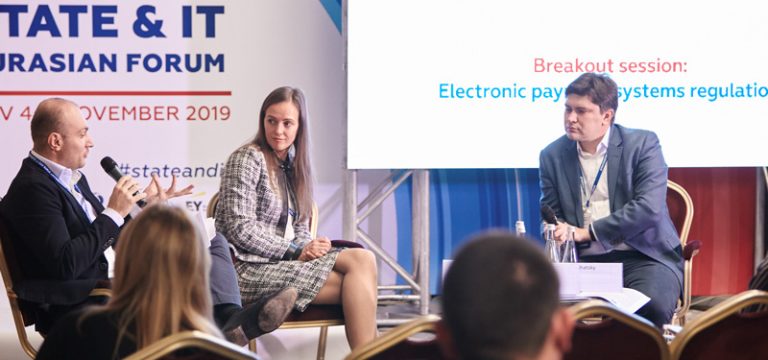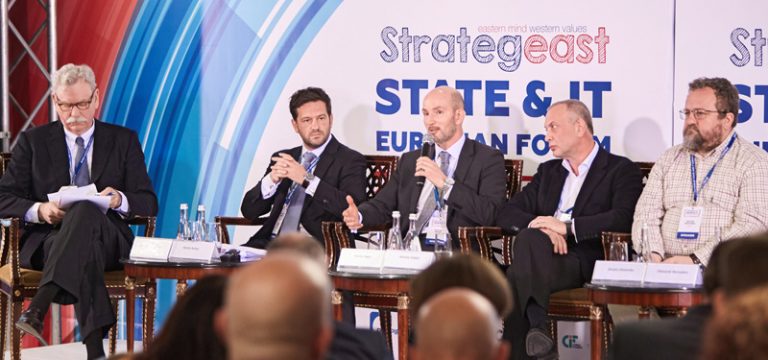![]() Presentation by Prasanna Lal Das, World Bank
Presentation by Prasanna Lal Das, World Bank
Download
When we talk about digital economy, we often like to say that data is the foundation of it. Without data there is no digital economy. So when countries like Ukraine and other countries in the region start talking about this digital economy, they need to start thinking about data first, but the foremost challenge is the challenge of data poverty. If you’re going to build an economy around data and you don’t actually have the data to build the economy around, your digital programs won’t go so far. So that’s going to be one of the themes in the presentation I’m going to make today – how do you go from where you are now to a successful digital economy?
The reality is that the world is drowning in data, now there are more data assets in the world than ever before and the amount of resources is actually growing pretty exponentially. There are some interesting statistics saying that ninety percent of the world’s data is produced in the last two years, other research says that in the last six months we doubled information of the amount of information out there.
So lots of numbers out there suffice to say that there’s a ton of information out there and is growing quite dramatically. What’s interesting, though, is that the nature and the source of this data has changed fundamentally. Historically much of what we did was not datafied. Now everything we do is datafied. So, when you walk on the street cameras actually are capturing information about you, your call is gathering information. As you move around the city, the cell phone in the pocket is constantly generating huge amounts of data.
Satellite images, sensors, devices, like our phones and others have become sources of new data, and are going to be the dominant sources going ahead in the future.
Ten years ago we had three hundred data interactions. Now we have five thousand data interactions per day, as individuals, which is a pretty dramatic number. Also, what’s interesting is that thirty percent of the data right now is real-time and real-time data is a pretty new phenomenon. In the old days they used to be captured at a particular point in time and by the time it actually meant 6-12 months later, now information is captured and used in real time all the time, and that is happening a lot because machine data is becoming the dominant type of data right.
But data coming from human beings is pretty important. So when you go to Facebook, for instance or when you type a search result in Google – that is human data, but when you’re walking down the street and a camera captures information about you – that’s machine data. Sensors out there that are capturing information on, let’s say, weather conditions, soil conditions, atmospheric conditions – are machine data and, as things stand right now, I think this year the amount of machine data will go beyond the amount of human data for the first time, and this change is going to be quite rapid and let me give you a sense of how we will experience this data in the future.
Data in all our physical infrastructure is going to be intelligent, is going to be sensitive, is going to make decisions and is going to affect how you and I live, is going to make hopefully, your life safer in many ways.
We don’t actually see that data as physical form, because it’s bits and bytes, but people build services using techniques, for instance, artificial intelligence or blockchain and all these sorts of applications.
Significant positive implications for us as individuals, for us as businesses and for governments, besides lots of positive things out there, are transparency and how it deals with corruption.
A digital society by default is less corrupt and more transparent, not necessarily fully. Our interactions allow audit trails to actually access information, that wasn’t possible in the past.
The idea behind the technology is to make it easier for businesses to comply with the regulations and cut out the middleman and remove the friction and corruption. I think this has been good for governments because they have the opportunities to actually engage citizens more directly, to provide services more transparently and much more effectively. So, lots of examples out there: getting building permits faster or actually getting an income tax done faster. We have re-thought the role of the government and the government now is the service provider rather than somebody that requires tax filing. So, the role of the government has changed quite significantly.
If we look at labor data, for instance, we need simple information like what skills exist in Ukraine right now? How are the skills changing? What skills do companies actually want at this point? Are Ukrainians actually able to find jobs in Ukraine or t are they leaving Ukraine to find those jobs? All these things were very hard to actually collect in the past, now it is much easier with LinkedIn, we’re able to actually track what kind of skills people in different countries actually have, how they’re reporting it and that’s not perfect data, but it gives you a good sense. It gives you a sense of how people change jobs, they’re able to see what sort of jobs are people moving from and the jobs are moving into, are they moving across geographies, for instance, are those geographies within the country and outside the country, and those are useful for governments to actually start thinking from a policy perspective. How do I keep the talent in the country etc?
So, the point I’m trying to make is as the world gets more digital, as data becomes more prevalent for citizens for private sector firms and for governments, we are becoming open to tremendous opportunities.
Non-state actors are the most powerful actors in the economy now. So traditionally, when you think of economic growth, the state plays a critical role. Even when you think of IT sector as well, you’ve taught that the state is actually playing the main role depending on the country you’re in of course, but usually when we think of data we think that states hold most of the world’s data. But now states hold a minority of the world’s data. The data is actually owned by the private sector or non-state actors, and they are going to be the engine of data collection. The future states will not be the engine of the regulation in the future. You have to create a fertile ecosystem for the private sector to actually collect data more effectively and efficiently. Let’s think about virtual communities that go beyond national boundaries. They are also becoming very critical to the economy. You don’t have to the prisoner of geography in the digital world, data flows quite easily across boundaries. So that’s the trend – to keep an eye on private sector, non-state actors and virtual communities that are big players in the data world.
The labor market itself is changing quite dramatically, and the traditional ways of looking at labor, are not helpful anymore.
Another interesting trend is human substitution technologies, robots or just bots are on the march. I should ask you, do you think your job can be replaced by a machine ten years from now? If you think so, raise your hand and I congratulate you and your confidence and I hope you’re right. The reality is that ninety five percent of the jobs will be done by machines internationally. So if you’re a musician, if you’re a lawyer, if you’re an accountant, if you’re a policy maker – a lot of those jobs will go to machines. Quite often we take our jobs with a little more seriousness than maybe they deserve. In reality, all of us will lose. We just have to start getting ready for it. The other thing is you need to start thinking of skills differently and start thinking of skills as a global resource and also think of skills that move rapidly across borders. So, one challenge that we’re seeing in many countries is the fact that they’re losing the best and brightest people, they move to other countries right and that trend will only intensify even if your local economy grows. Your labor does not need to be here in the digital economy, so you could have the world’s largest company based here, but all the people who could work there will be somewhere else. So that’s something for policymakers to start thinking about data driven jobs. First of all, they don’t need to be done by human beings and the labor does not need to be tied to a geography right. So you should think – how do you make your country, your locations, attractive to your local talent, but also to international talent?
What about industries? Airbnb right now is more valuable than the five largest hotel chains. It actually manages more properties than those five do. Nobody in Airbnb is a hotel industry professional actor, it was essentially a digital data company. If you’re a lawyer – expect non-lawyers that change the legal field. And it is already beginning to happen. If you’re a policy maker or any other professional expect expect disruption to come from outside and expect it to happen very quickly. After you see a trend, you can’t wait for ten years to figure it out. You have to learn to adapt to it. Think of digital alliances, for instance, the European Digital Single Market.
All the main points we should think about:
One is that you cannot have digital economy without data and most of you most of the countries, most of the firms do not have this data. At this point, you have to start becoming a player in the data space. Don’t just talk about regulations and skills. Let’s start building this asset. You cannot wait five years to put data strategy in place. Now if you don’t have one already, let’s go and get started.

